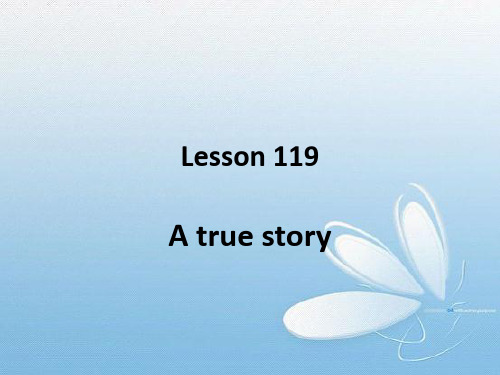新概念一册_119-120课课件-
合集下载
新概念英语第一册_第119-120课最终版PPTKEJ

❖ Torch n. ❖ ①手电筒 turn off/on the torch ❖ ②火炬 light the torch
.
9
Key words&expressions
❖ Voice n.
❖ ①声音 in an angry voice
❖ ②意见 speak out my voice
❖ lose one’s voice raise one’s voice
.
16
Language points Nhomakorabea❖ 3、It happened to a friend of mine a year ago.
happen to sb./sth. 发生在某人身上/某物上(通常 是不好的事)
What happened to your car? ❖ 双重所有格:a friend of mine = my friend;
Were you watching TV at ten last night? 6. Amy was writing a letter when the telephone rang.(对划线部分提问)
What was Amy doing when the telephone rang?
.
2
Key words&expressions
.
13
Listen and answer.
1. What was George doing when the thieves climbed into his kitchen?
He was reading in bed.
1. Did the thieves turn on the torch? Why?
.
7
.
9
Key words&expressions
❖ Voice n.
❖ ①声音 in an angry voice
❖ ②意见 speak out my voice
❖ lose one’s voice raise one’s voice
.
16
Language points Nhomakorabea❖ 3、It happened to a friend of mine a year ago.
happen to sb./sth. 发生在某人身上/某物上(通常 是不好的事)
What happened to your car? ❖ 双重所有格:a friend of mine = my friend;
Were you watching TV at ten last night? 6. Amy was writing a letter when the telephone rang.(对划线部分提问)
What was Amy doing when the telephone rang?
.
2
Key words&expressions
.
13
Listen and answer.
1. What was George doing when the thieves climbed into his kitchen?
He was reading in bed.
1. Did the thieves turn on the torch? Why?
.
7
新概念英语一lesson119-120(共20页)

• George heard the noise and came downstairs quickly. • heard the noise 听到声响 • came downstairs 下楼来 • He turned on the light, but he couldn’t see anyone. The thieves had already gone. • turn on the light 开灯 • someone用在肯定句中 • anyone用在否定句中
过去完成时
• • • • • • 过去完成时构成形式: had+ 过去分词 否定式:在had的后面加not 疑问句式:把had提前 我在干家务之前已经完成了作业。 I had finished my homework before I did the house work. • I had not finished my homework before I did the house work. • Had you finished your homework before you did the house work?
• • • • • • • • •
torch n. 1) 手电筒 开手电筒 turn on a torch 关手电筒 turn off a torch 2)火炬 Kindle a torch 燃起火炬 torch relay 火炬传递
• • • • • • • • • • •
voice n. 1) 声音 in an angry voice 以生气的声音 以伤心的声音 in a sad voice 他以伤心的声音告诉了我这个消息。 He told me this news in a sad voice. lose one’s voice 嗓子变哑 我因重感冒,嗓子都哑了。 I’ve lost my voice because of a bad cold.
新概念英语第一册119-120

• She drove as fast as the could. • 她尽可能地把车开快
• George heard the noise and came downstairs quickly. • heard the noise 听到声响 • came downstairs下楼来
• • • • • He turned on the light, but he couldn’t see anyone. The thieves had already gone. turn on the light 开灯 someone用在肯定句中 anyone用在否定句中
2)火炬 Kindle a torch 燃起火炬 torch relay 火炬传递
• voice n.
• 1) 声音 • in an angry voice 以生气的声音 • in a sad voice以伤心的声音 • He told me this news in a sad voice. • 他以伤心的声音告诉了我这个消息。 • lose one’s voice 嗓子变哑 • 我因重感冒,嗓子都哑了。 • I’ve lost my voice because of a bad cold.
单词学习
• • • • • • • • story happen thief enter dark torch voice parrot n. 故事 v. 发生 n. 贼 v. 进入 adj. 黑暗的 n. 手电筒 n. (说话的)声音 n. 鹦鹉
过去完成时
• 1.表示在过去某一时刻或某一动作以前己经完成 的动作,即“过去 的过去”。 • 我回来之前,他们己经离去。 • They had left before I came back.
• George heard the noise and came downstairs quickly. • heard the noise 听到声响 • came downstairs下楼来
• • • • • He turned on the light, but he couldn’t see anyone. The thieves had already gone. turn on the light 开灯 someone用在肯定句中 anyone用在否定句中
2)火炬 Kindle a torch 燃起火炬 torch relay 火炬传递
• voice n.
• 1) 声音 • in an angry voice 以生气的声音 • in a sad voice以伤心的声音 • He told me this news in a sad voice. • 他以伤心的声音告诉了我这个消息。 • lose one’s voice 嗓子变哑 • 我因重感冒,嗓子都哑了。 • I’ve lost my voice because of a bad cold.
单词学习
• • • • • • • • story happen thief enter dark torch voice parrot n. 故事 v. 发生 n. 贼 v. 进入 adj. 黑暗的 n. 手电筒 n. (说话的)声音 n. 鹦鹉
过去完成时
• 1.表示在过去某一时刻或某一动作以前己经完成 的动作,即“过去 的过去”。 • 我回来之前,他们己经离去。 • They had left before I came back.
新概念第一册lesson119-120

❖ 4. enter v. ❖ ①进入,穿入 enter the room ❖ 他们进入了房子后,就去了餐厅。
After they had entered the house, they went into the dining room. ❖ ②参加,加入 enter the Party(入党)
名词所有格's;同位语;still 仍然。
❖ 15、"Nothing, Henry," George said and smiled. "Go back to sleep."
go back to do sth. 回去继续做某事。 例如:go back to work go back to some place 回到某地。 例如:go back to one’s hometown
Key words&expressions
❖ story
n.
❖ happen
v.
❖ thief
n.
❖ enter
v.
❖ dark
adj.
❖ torch
n.
❖ voice
n.
❖ parrot
n.
❖ exercise book n.
故事 发生 贼 进入 黑暗的 手电筒 (说话的)声音
鹦鹉 练习本
Key words&expressions
turn on 打开 ←→ 关上 turn off; 复合不定代词 anyone 任何人
❖ 13、The thieves had already gone.
过去完成时。
had gone = had left = had run away(上文)
❖ 14、But George's parrot, Henry, was still there.
新概念英语第一册课件lesson 119-120

我来讲故事
Key words and expressions
(单词百宝箱)
1. story
/ 5stR:ri/
2. happen
/ 5hApEn/
3. thief
/ Wi:f/
4. enter
/ 5entE/
5. dark 6. torch 7. voice
/ da:k/ / tR:tF/ / vRis/
ago.
② v. 碰巧,恰好(to) 句型: 人+ happen to do sth. 碰巧 e.g. I happened to meet her on my way home. e.g. I fergot to bring the pen. She happens to have one.
4. 主从复合句:
3. happen v. 发生
① v. 发生 句型: 事 + happen to sb. 发生在……身上 e.g. It happened to a friend of mine last year. e.g. A strange thing happened to a friend of mine a year
8. parrot
/ 5pArEt/
9. exercise book
n.故事
v.发生;碰巧 n.贼 v.进入 a.黑暗的 n.手电筒 ,火炬 n.(说话的)声音 n.鹦鹉 n.练习本
1. story
/ 5stR:ri/
n.故事
1. story-stories e.g. tell stories.
2. happen
8. parrot
/ 5pArEt/
n.鹦鹉Βιβλιοθήκη 8. parrot: 鹦鹉 carrot: 胡萝卜
2024年新概念英语NCE1_lesson119-120(共33页)课件

4. Paul went(go) out with Jane after he had made(make) a phone call.
5. They had learned(learn) over 2000 words by the end of last term.
6. I have a lot of work to do(do).
(D)3. She said she ___the principle already.
A .has seen
B. saw
C. will see D.had seen
(D)4.A friend of ___ is a doctor. A.me B.my C.I D.mine
(C)5. She had written a number of books ______ the end of last year. A.for B.in C.by D.on
4.当安下楼时,小偷已走开了。 When Ann came downstairs,the theif ___ already ____.
1.我要给你讲一个真实的故事。 I want to tell you a true story.
2.当他到达车站时,火车已离开了。 When he got to the station,the train had already gone.
questions
1.When did two thieves climb into the kitchen?
2.How is Henry?
happen
1.A car accident happened to her
this morning.
2.What happened to you? 3.What happened to Helen last night? 4.I am very sorry for all happened to
新概念1 Lesson 119-120

Key words&expressions
stoபைடு நூலகம்y
n.
happen
v.
thief
n.
enter
v.
dark
adj.
torch
n.
voice
n.
parrot
n.
exercise book n.
故事 发生 贼 进入 黑暗的 手电筒 (说话的)声音
鹦鹉 练习本
story n. (两个清辅音连在一起时,第二个音要浊化)
the sound of music 音乐之声 noise 表示杂音,不悦人的声音
parrot n. 鹦鹉
Language points
1、Do you like stories?
这里stories泛指故事这一类东西。
2、I want to tell you a true story.
3. 和up till/until + 过去时间点连用,如: up till then, up until last night …
Li Lei _h_a_d_w_a_s_h_e_d__(wash) the dishes up till then.
4. 常用于宾语从句中
She said that she __h_a_d_w_r_it_t_e_n____(write) three e-mails.
5、After they had entered the house, they went into the dining room. =They had entered the house before they went into the dining room. 强调两个动作的前后顺序时,较早的动作要用过去完 成时。 及物动词 enter = 不及物动词 go into
新概念119-120课(第一课时)

when
不管是在口语中,还是在书面语中,when是一个十分活跃的词,该词主要用作 连词和副词,但是在意义方面其用法比较复杂。 一、作副词 1. 作疑问副词,用于构成特殊疑问句,意为“什么时候;何时”
When will they come back?他们什么时间回来? 2. 作连接副词,引导名词性从句,或与不定式连用,意为“什么时候”
lesson 116
every 每一个
every 每一个 everyone 每一个人 everybody 每一个人(多用于口语中) everything 每件事情 everywhere 到处,每个地方
none 没有
no one 没有人 nobody 没有人 nothing 没什么事情 nowhere 不在任何地方
★ joke
/d uk/
v. 开玩笑
4
Key knowledge
不定代词
形容词修饰不定代词,放在不定代词之后
6/16/2021
课文详解
1. Isn‘t there anyone at home? 家里没人吗?
否定疑问句 复合不定代词 anyone 看作单数, 用在疑问句和否定句中。
6/16/2021
It's nice and warm sitting by the fire. Everybody arrived nice and early.
6/16/2021
e and have something to drink.
11. May I have a glass of beer please? May I…?≈ Could I…? 语气比can I…?委婉
复合不定代词 no one看作单数,本身表否定。 No one wants that room.
- 1、下载文档前请自行甄别文档内容的完整性,平台不提供额外的编辑、内容补充、找答案等附加服务。
- 2、"仅部分预览"的文档,不可在线预览部分如存在完整性等问题,可反馈申请退款(可完整预览的文档不适用该条件!)。
- 3、如文档侵犯您的权益,请联系客服反馈,我们会尽快为您处理(人工客服工作时间:9:00-18:30)。
Language points
6、It was very dark, so they turned on a torch. = They turned on a torch because it was very dark.
7、Suddenly, they heard a voice behind them. hear 强调结果。 hear-heard- heard。
How many? 3.Who called out to the thieves in the dark? 4.What did the thieves do then? 5.Did George come downstairs? 6.Had the theives gone when George came downstairs?
Language points
1、I want to tell you a true story. tell sb a story a story to sb. sb. about sth. sb that从句 To tell you the truth true 真实可信的 real 真正存在的
过去完成时
用法:表示过去某一时间或动作以前己
经完成的动作,即“过去的过去”。
时间状语: when,before,after,by等介词
短语或从句
结 构: had +过去分词(done)
否定式: had+not
疑问句式:had提前
只在和过去某个时间或动作相比较的时候才会 使用过去完成时。
e.g. The film had already begun before I came back.
after + 过去完成时, 主句用一般过去时
e.g. He left the room after he had turned off the light .
1. I ______ 900 English words by the time I was ten。 C A. learned B. was learning C. had learned D. learnt 2. By the time my parents reached home yesterday, I _____ A the dinner already. A had cooked B. cooked C. have cooked D. was cooked D 3. By the time he was ten years old, he _________. A has completed university B. has completed the university C had completed an university D. had completed university 4. He _____ A to play ____ before he was 11 years old. A had learned, piano B. had learned, the piano C. has learned, the piano D. learns ,piano. 5.The students _________ their classroom when the B visitors arrived. A . have cleaned B. had cleaned C. was cleaned D. have been cleaned
Language points
3、It happened to a friend of mine a year ago. happen to sb./sth. 发生在某人身上/某物上 (通常是不好的事) 双重所有格:a friend of mine One of my friends a friend of my father’s one of my father’s friends
嗓子变哑
drop
提高嗓门
voice 人说话时嗓子发出的声音 sound 世间万物的声音 noise 杂音,不悦的声音
Parrot n. 鹦鹉
video
Questions:
1.When did the story happen?
2.How did the thieves come into his house?
Language points
14、"Nothing, Henry," George said and smiled. "Go back to sleep." go back to do sth. 继续做某事。 go back to work go back to sp 回到某地。 go back to one’s hometown
8、What's up? 【口语】 = What’s wrong? = What’s the matter? 【寒暄】What’s up, man? 询问对方最近过得如何 9、The thieves dropped the torch and ran away as quickly as they could. drop 扔掉; run away 逃跑; as.+adv..+ as sb.can/could尽可能…地 as possible Run as fast as you can! Please write to me as soon as possible. I must work as hard as I can.
Lesson
120
1.When Tom
came come
in , Ann was cook . cooking
cooking , Tom come 2.When Ann was cook came in . 3.While Ann was cook cooking , Tom come came in
Language points
11、George heard the noise and came downstairs quickly. downstairs下楼,楼下 ←→ upstairs 上楼, 楼上 12、He turned on the light, but he couldn't see anyone. turn on 打开 ←→ 关上 turn off; 复合不定代词 anyone 任何人 13、The thieves had already gone. 过去完成时。 had gone = had left = had run away(上文)
See you next week!!
enter
v. 1、 enter +某地 进入 她悄悄地进入屋中。 She entered the room quietly. enter into the computer输入电脑 2. enter for sth(test,competition, sports meeting… 报名参加 很多学生报名参加这个竞赛。 Many students entered for this competition.
I had finished my homework before I did the house work. I had not finished my homework before I did the house work. Had you finished your homework before you did the house work?
Happen v. 发生 Sth.happen to sb sth发生在某人/某物上 (通常是不好的事)
What happened
to them ?
An accident happened to them yesterday.
thief n. 复数:thieves A world without thieves.
Languagቤተ መጻሕፍቲ ባይዱ points
4、While my friend, George, was reading in bed, two thieves climbed into his kitchen. , climb into 爬进。 5、After they had entered the house, they went into the dining room. =They had entered the house before they went into the dining room. 强调两个动作的前后顺序时,较早的动作要用 过去完成时。 After+过去完成时,主句用一般 过去时。 before+一般过去时,主句用过去完 成时。
4.While Ann was cook ,Tom read . was reading cooking
What were you doing when he came in? I was drawing a picture when he came in . What had you done when he came in ? I had drawn a picture when he came in. I had opened the door when he came in . I had written my name on the blackboard when he came in. What had you done before you came here? I had had breakfast before I came here. After I had had breakfast ,I came here.
